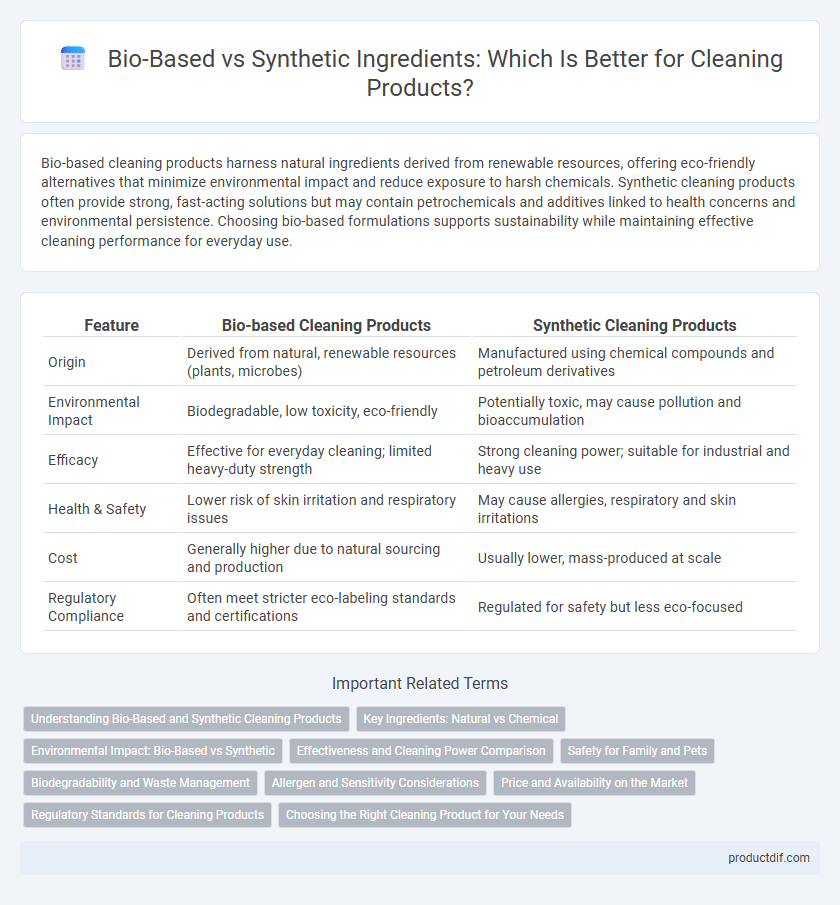Bio-based cleaning products harness natural ingredients derived from renewable resources, offering eco-friendly alternatives that minimize environmental impact and reduce exposure to harsh chemicals. Synthetic cleaning products often provide strong, fast-acting solutions but may contain petrochemicals and additives linked to health concerns and environmental persistence. Choosing bio-based formulations supports sustainability while maintaining effective cleaning performance for everyday use.
Table of Comparison
| Feature | Bio-based Cleaning Products | Synthetic Cleaning Products |
|---|---|---|
| Origin | Derived from natural, renewable resources (plants, microbes) | Manufactured using chemical compounds and petroleum derivatives |
| Environmental Impact | Biodegradable, low toxicity, eco-friendly | Potentially toxic, may cause pollution and bioaccumulation |
| Efficacy | Effective for everyday cleaning; limited heavy-duty strength | Strong cleaning power; suitable for industrial and heavy use |
| Health & Safety | Lower risk of skin irritation and respiratory issues | May cause allergies, respiratory and skin irritations |
| Cost | Generally higher due to natural sourcing and production | Usually lower, mass-produced at scale |
| Regulatory Compliance | Often meet stricter eco-labeling standards and certifications | Regulated for safety but less eco-focused |
Understanding Bio-Based and Synthetic Cleaning Products
Bio-based cleaning products are derived from renewable natural ingredients such as plant oils, sugars, and enzymes, offering eco-friendly alternatives with biodegradable properties. Synthetic cleaning products typically consist of chemically formulated compounds designed for high efficiency and durability but may contain non-biodegradable ingredients and potential environmental pollutants. Understanding the composition and environmental impact of both bio-based and synthetic cleaning products helps consumers make informed choices balancing effectiveness and sustainability.
Key Ingredients: Natural vs Chemical
Bio-based cleaning products primarily utilize natural ingredients such as plant oils, enzymes, and essential oils, which offer biodegradable and non-toxic alternatives to traditional chemicals. Synthetic cleaners often contain chemical surfactants, solvents, and preservatives like sodium lauryl sulfate and ammonia, providing stronger immediate stain removal but potentially posing environmental and health risks. The shift towards bio-based key ingredients supports sustainability by reducing chemical residues and promoting safer household environments.
Environmental Impact: Bio-Based vs Synthetic
Bio-based cleaning products significantly reduce environmental impact by utilizing renewable resources, leading to lower carbon emissions and enhanced biodegradability compared to synthetic alternatives. Synthetic cleaners often rely on petrochemicals, contributing to pollution and persistent ecological toxicity. Choosing bio-based formulations supports sustainable production and minimizes long-term harm to aquatic ecosystems and soil health.
Effectiveness and Cleaning Power Comparison
Bio-based cleaning products harness natural enzymes and plant derivatives that effectively break down grease and grime without harsh chemicals, offering strong cleaning power while being environmentally friendly. Synthetic cleaners often contain engineered surfactants and solvents that deliver rapid stain removal and heavier-duty cleaning performance, especially on industrial or stubborn dirt. Choosing between bio-based and synthetic depends on the desired balance of eco-safety and maximum cleaning strength for specific applications.
Safety for Family and Pets
Bio-based cleaning products are derived from natural ingredients, offering a safer option for families and pets due to their lower toxicity and reduced risk of allergic reactions. Synthetic cleaners often contain harsh chemicals and volatile organic compounds (VOCs) that can cause respiratory issues, skin irritation, and long-term health concerns. Choosing bio-based formulations minimizes exposure to harmful substances, ensuring a healthier home environment for both children and animals.
Biodegradability and Waste Management
Bio-based cleaning products typically exhibit higher biodegradability due to their natural origins, facilitating easier waste management and reducing environmental impact. Synthetic cleaning agents often resist degradation, leading to accumulation in ecosystems and complicating waste treatment processes. Selecting bio-based formulations is crucial for promoting sustainable waste management practices and minimizing pollution in wastewater systems.
Allergen and Sensitivity Considerations
Bio-based cleaning products often reduce allergen exposure due to their natural, plant-derived ingredients, minimizing harsh chemical irritants commonly found in synthetic alternatives. Synthetic cleaners frequently contain fragrances and preservatives that can trigger sensitivity reactions such as skin irritation and respiratory issues. Choosing bio-based formulations supports a safer environment for individuals prone to allergies and chemical sensitivities.
Price and Availability on the Market
Bio-based cleaning products often have higher prices due to limited production scale and reliance on renewable raw materials. Synthetic alternatives benefit from established supply chains and mass production, resulting in greater availability and more competitive pricing. Market trends show increasing demand for bio-based options, but their accessibility remains lower compared to widely distributed synthetic cleaners.
Regulatory Standards for Cleaning Products
Regulatory standards for cleaning products increasingly emphasize the use of bio-based ingredients to meet sustainability and safety criteria set by agencies such as the EPA and EU Ecolabel. Synthetic cleaning agents are subject to stringent chemical composition regulations to limit environmental toxicity and human health risks. Compliance with these standards drives innovation in bio-based formulations, balancing efficacy with eco-friendly requirements.
Choosing the Right Cleaning Product for Your Needs
Bio-based cleaning products utilize natural ingredients like plant extracts and enzymes, offering eco-friendly and biodegradable alternatives that reduce environmental impact. Synthetic cleaning products often contain chemical compounds engineered for powerful stain removal and disinfection, providing targeted effectiveness for heavy-duty cleaning tasks. Selecting the right cleaning product depends on balancing environmental considerations, cleaning performance, and specific surface requirements to achieve optimal results.
Bio-based vs Synthetic Infographic

 productdif.com
productdif.com